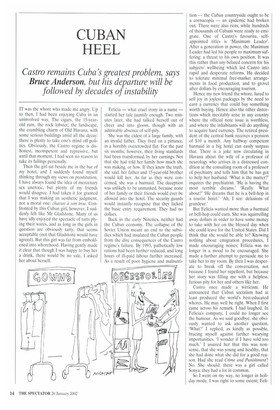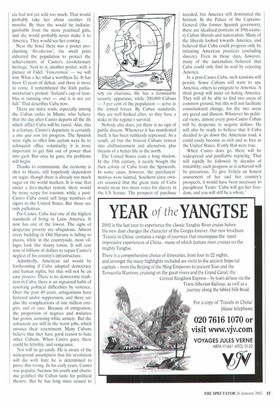CUBAN HEEL
Castro remains Cuba's greatest problem, says
Bruce Anderson, but his departure will be
followed by decades of instability
IT was the whore who made me angry. Up to then, I had been enjoying Cuba in an uninvolved way. The cigars, the 15-yearold rum, the rock lobster; the landscape, the crumbling charm of Old Havana, with some serious buildings amid all the decay: there is plenty to take one's mind off politics. Obviously, the Castro regime is dishonest, incompetent and repressive, but until that moment, I had seen no reason to take its failings personally.
Then the girl sat beside me in the bar of my hotel, and I suddenly found myself thinking through my views on prostitution. I have always found the idea of mercenary sex unerotic, but plenty of my friends would disagree. I had taken it for granted that I was making an aesthetic judgment, not a moral one: chacun a son two. Confronted by this Cuban girl, however, I suddenly felt like Mr Gladstone. Many of us have idly enjoyed the spectacle of tarts plying their wares, and as long as the girls in question are obviously tarty, that seems acceptable (not that Gladstone would have agreed). But this girl was far from emboldened into whorehood. Having gently made it clear that though I was happy to buy her a drink, there would be no sale, I asked her about herself.
Felicia — what cruel irony in a name — started her tale jauntily enough. Two minutes later, she had talked herself out of cheer and into gloom, though with an admirable absence of self-pity.
She was the eldest of a large family, with an invalid father. They lived on a pittance, in a horribly overcrowded flat. For the past six months, however, their living standards had been transformed, by her earnings. Not that she had told her family how much she was making, or how. If they knew the truth, she said, her father and 15-year-old brother would kill her. As far as they were concerned, she was a barmaid. The deception was unlikely to be unmasked, because none of her family or their friends would ever be allowed into the hotel. The security guards would instantly recognise that they lacked the basic entry requirement. They had no dollars.
Back in the early Nineties, neither had the Cuban economy. The collapse of the Soviet Union meant an end to the subsidies which had insulated the Cuban people from the dire consequences of the Castro regime's failure. By 1993, pathetically low rations had been further reduced, and long hours of ill-paid labour further increased. As a result of poor hygiene and malnutri tion — the Cuban countryside ought to be a cornucopia — an epidemic had broken out. There were also riots, while hundreds of thousands of Cubans were ready to emigrate. One of Castro's favourite, selfappointed titles is 'Maximum Leader'. After a generation in power, the Maximum Leader had led his people to maximum suffering: a threat to his own position. It was this rather than any belated concern for his subjects' wellbeing which led Castro into rapid and desperate reforms. He decided to tolerate minimal free-market arrangements in food production, and to grovel after dollars by encouraging tourism.
Hence my new friend the whore, lured to sell joy in joyless packages by the need to earn a currency that could buy something worth buying. Hence also the other distortions which inevitably arise in any country where the official note issue is worthless, and where the inhabitants will do anything to acquire hard currency. The retired president of the central bank receives a pension of $10 a month. Any halfway competent barmaid in a big hotel can easily surpass that. There is a joke now circulating in Havana about the wife of a professor of neurology who arrives in a distressed condition at the consulting room of a professor of psychiatry and tells him that he has got to help her husband. 'What is the matter?' inquires the psychiatrist. 'He is having the most terrible dreams."Really. What about?' He dreams that he is a bell-hop in a tourist hotel."Ah, I see: delusions of grandeur.'
But Felicia wanted more than a barmaid or bell-hop could earn. She was squirrelling away dollars in order to have some money to take with her on the blessed day when she could leave for the United States. Did I think that she would be able to? Knowing nothing about emigration procedures, I made encouraging noises; Felicia was no longer in a mood to be encouraged. She made a further attempt to persuade me to take her to my room. By then I was desperate to break off the conversation, not because I found her repellent, but because her story was filling me with a helpless, furious pity for her and others like her.
Castro once made a witticism. He announced that Cuban socialism had at least produced the world's best-educated whores. He may well be right. When I first came across his remark, I had laughed. In Felicia's company, I could no longer see the humour. As we said goodbye, she obviously wanted to ask another question. 'What?' I replied, as kindly as possible, bracing myself against further wearying importunities. 'I wonder if I have sold too much.' I assured her that this was nonsense, that she was young and healthy, that she had done what she did for a good reason. Had she read Crime and Punishment? No. She should; there was a girl called Sonya: they had a lot in common.
So I went on my way, no longer in holiday mode. I was right to some extent; Feli cia had not yet sold too much. That would probably take her about another 18 months. By then she would be indistinguishable from the more practised girls, and she would probably never make it to America. They would see her coming.
Near the hotel there was a poster proclaiming 'Revolucion.; the small print exhorted the population to protect the achievements of Castro's revolutionary heritage. Next to it, another poster, with a picture of Fidel, Weneeremos' — we will win. What a lie; what a worthless lie. It has been 43 years of defeat, and there is more to come. I remembered the Irish parliamentarian's protest: 'Ireland's cup of troubles is running over — and it is not yet full.' That describes Cuba now.
There are naive souls, especially among the Cuban exiles in Miami, who believe that the day after Castro departs all the ills which afflict Cuba will be cured. Alas, this is a fantasy. Castro's departure is certainly a sine qua non for progress. The Spanish were right to offer him asylum were he to relinquish office voluntarily; it is more important to get him out of power than into gaol. But once he goes, the problems will begin.
Thanks to communism, the economy is shot to blazes, still hopelessly dependent on sugar, though there is already too much sugar on the world markets. It is true that under a free-market system, there would be more scope for tourism, while a postCastro Cuba could sell large numbers of cigars to the United States. But those are only palliatives.
Pre-Castro, Cuba had one of the highest standards of living in Latin America. It now has one of the lowest, The signs of desperate poverty are ubiquitous. Almost every building in Old Havana is falling to pieces, while in the countryside, most villages look like shanty towns. It will cost tens of billions of dollars to repair Castro's neglect of his country's infrastructure.
Admittedly, American aid would be forthcoming if Cuba adopted democracy and human rights, but that will not be an easy process. There is no democratic tradition in Cuba; there is an ingrained habit of resolving political difficulties by violence. Over the past 40 years, antagonisms have festered under suppression, and there are also the complications of one million émigrés, and of race. Because of emigration, the proportion of negroes and mulattos has grown, arousing white anxiety. But the coloureds are still in the worst jobs, which arouses their resentment. Many Cubans believe that they have good reason to hate other Cubans. When Castro goes, there could be febrility, and vengeance.
Nor will he go easily. He is aware of the widespread assumption that his revolution will die with him; he is determined to prove this wrong. In his early years, Castro was popular, because his youth and charisma gratified the Cuban taste for political theatre. But he has long since ceased to rely on charisma. He has a formidable security apparatus, while 200,000 Cubans — 3 per cent of the population — serve in the armed forces. By Cuban standards, they are well looked after, so they have a stake in the regime's survival.
Nobody else does, yet there is no sign of public dissent. Whenever it has manifested itself, it has been ruthlessly repressed. As a result, all but the bravest Cubans retreat into disillusionment and alienation, plus dreams of a better life in the north.
The United States casts a long shadow. In the 19th century, it nearly bought the then colony of Cuba from the Spaniards. In some cases, however, the purchasers' motives were tainted. Southern slave owners assumed that the great state of Cuba would mean two more votes for slavery in the US Senate. The prospect of purchase receded, but America still dominated the horizon. In the Palace of the CaptainsGeneral (the former Spanish governors), there are idealised portraits of 19th-century Cuban liberals and nationalists. Many of the liberals looked towards America, and believed that Cuba could progress only by imitating American practices (excluding slavery). Even in those days, however, many of the nationalists believed that Cuba could only find its soul by rejecting America.
In a post-Castro Cuba, such tensions will persist, Some Cubans will want to ape America, others to emigrate to America. A third group will insist on hating America. They will all be able to find two areas of common ground, but this will not facilitate constitutional change, for the two areas are greed and illusion. Whatever his political views, almost every post-Castro Cuban will be desperate to acquire dollars. He will also be ready to believe that if Cuba decided to go down the American road, it could easily become as rich and as free as the United States. If only that were true.
When Castro does go, there will be widespread and justifiable rejoicing. That will rapidly be followed by decades of instability; such progress as is achieved will be precarious. To give Felicia an honest assessment of her and her country's prospects, it would have been necessary to paraphrase Yeats: 'Cuba will get her freedom, and you will still be a whore.'



















































































 Previous page
Previous page